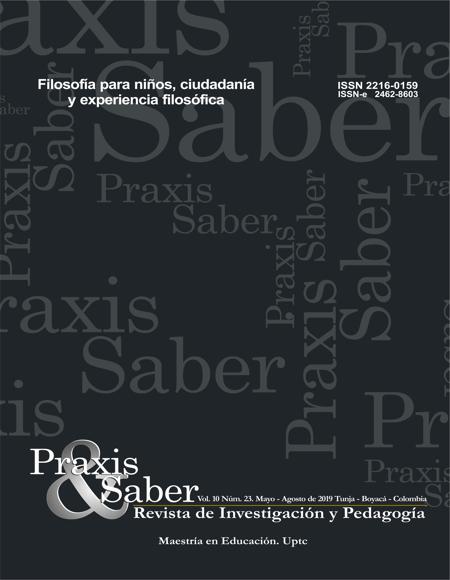Technological surveillance: Arkangel in frames

Abstract
This paper analyzes some frames of the TV series Black Mirror, episode Arkangel. According to some theoretical lines of contemporary scholars such as Deleuze, Bauman and Han, there are different situations that relate control and surveillance to childhood, which is tracked by technological devices. The social consequences occur in the near future determined by technology as a center of the virtual monitoring mechanisms. The work methodology is based on a bibliographic review and a theoretical reflection about the analyzed episode. The work scheme has been articulated in five frames, as follows: from the spoiler to the philosophy, the relation between childhood and technological influence, the interactions between technology and surveillance, the diverse properties and consequences and, lastly, the techno-dependence. At the end, there are some considerations that allow us to raise new questions.
Keywords
childhood, technology, control, surveillance, information society
References
Bauman, Z. (2017). Vida líquida (Trad. A. Santos). Bogotá: Planeta.
Bauman, Z., & Lyon, D. (2013). Vigilancia líquida (Trad. A. Capel). Buenos Aires: Paidós.
Beck, U. (2013). La sociedad del riesgo: Hacia una nueva modernidad. Barcelona: Paidós.
Bernal, J. (2018). Os paradoxos da representação na era da informação. Educação e filosofia, 31, 1675-1692. https://doi.org/10.14393/REVEDFIL.issn.0102-6801.v31n63a2017-18
Borgmann, A., & Mitcham, C. (2007). The question of Heidegger and technology. Philosophy Today, 31(4), 98-194.
Bostrom, N. (2009). The Future of Humanity. En J. Berg, E. Selinger, & S. Riis (Eds.), New Waves in Philosophy of Technology (pp. 186-216). New York: Palgrave McMillan.
Buckingham, D. (2002). Crecer en la era de los medios electrónicos: tras la muerte de la infancia (Trad. R. Filella). Madrid: Morata.
Castells, M. (1999). La era de la información. México: Siglo XXI editores.
Deleuze, G. (1995). Post-scriptum sobre las sociedades de control. En J. Pardo (Trad.), Conversaciones (1972 - 1990) (2a ed.) (pp. 277-286). Valencia: Pre-textos.
Díaz-Bernal, J. (2016). Tecnología: ¿un desafío para salir del riesgo? Praxis & Saber, 7(14), 71-90. https://doi.org/10.19053/22160159.5218
Díaz-Bernal, J. (2017). Encontros da tecnologia e sociedade da informação: perspectivas da filosofia da educação no século XXI (Tese, Universidade Federal de Uberlândia). Recuperado de https://repositorio.ufu.br/handle/123456789/21134
Ellul, J. (1988). Le bluff technologique. París: Hachette.
Foucault, M. (2012). Vigilar y castigar. Nacimiento de la prisión (Trad. A. Garzón). Buenos Aires: Siglo Veintiuno Editores.
Han, B. (2010). La sociedad del cansancio (Trad. A. Saratxaga). Barcelona: Herder.
Han, B. (2013). La sociedad de la transparencia (Trad. R. Gabás). Barcelona: Herder.
Han, B. (2014). En el enjambre (Trad. R. Gabás). Barcelona: Herder.
Himanen, P. (2001). The Hacker Ethic and The Spirit of The Informational Age. New York: Random House Trade Paperbacks.
Ierardo, E. (2018). Sociedad Pantalla. Buenos Aires: Continente.
Marcuse, H. (2013). One-Dimensional Man: Studies in the Ideology of Advanced Industrial Society. London: Routledge.
Ortega, J., & Gasset, J. (1964). Meditación sobre la técnica. En Obras Completas: Vol. V: 1933 – 1941 (6a ed.) (pp. 317-378). Madrid: Revista de Occidente.
Postman, N. (2011a). Technopoly: The Surrender of Culture to Technology. New York: Knopf Doubleday Publishing Group.
Postman, N. (2011b). The Disappearance of Childhood. New York: Knopf Doubleday Publishing Group.
Raymond, E. (2000). The Cathedral and the Bazaar (3a ed.). Open Publication License, version 2.0.
Rueda, R., & Quintana, A. (2013). Ellos vienen con el chip incorporado. Bogotá: IDEP.
Toffler, A. (1995). La tercera ola (Trad. A. Martín). Barcelona: Plaza & Janés.
Virilio, P. (1996). El arte del motor: aceleración y realidad virtual (Trad. H. Pons). Buenos Aires: Manantial.
Wallin, J. (2013). Four Propositions on the Limits of Control. Visual Arts Research, 39(1), 6-8. https://doi.org/10.5406/visuartsrese.39.1.0006
Wurman, R., Leifer, L., & Sume, D. (2001). Information Anxiety (Vol. 2). New York: Doubleday.
